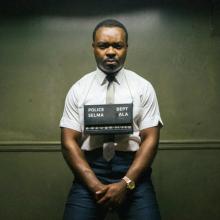Civil Rights
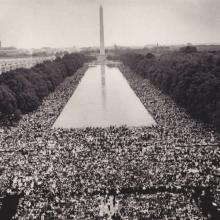
Image via Robert Joyce papers, 1952-1973 / flickr.com
The Bahá'í writings say that human beings are like mines rich in gems of inestimable value and that one of the purposes of this earthly life is to discover our God-given gems, polish them, and bring them out to serve humanity. Today I write about a wonderful woman who has offered her many incredible gems in service.
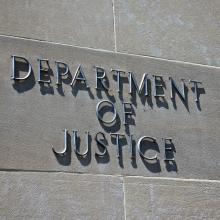
Image via kenkistler / Shutterstock.com
The U.S. Department of Justice has opened a civil rights investigation into the decision by Bernards Township authorities to deny a Muslim community’s application to build a mosque in the township, a spokesman for the U.S. attorney’s office in Newark has confirmed. The investigation will look into whether the township violated the rights of members of the Islamic Society of Basking Ridge over its prolonged, and ultimately failed, application to build a mosque on Church Street, according to the U.S. Attorney’s office.

Indiana State Capitol. Image via Jimmy Emerson, DVM / flickr.com
In the legislation, the state’s schools and businesses would be allowed to write their own policies on the use of bathrooms or showers based on sex, sexual orientation, or gender identity. They also could decide for themselves what dress code to impose on students and workers.
Under the bill, those rules wouldn’t count as discriminatory.
House and Senate Democrats have called for simpler solution, saying a fix could be had by adding four words and a comma: “sexual orientation, gender identity” to the Indiana’s civil rights law.
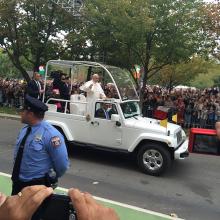
Pope Francis passes the crowd along the street of Philadelphia on September 27, 2015. Photo via Kimberly Winston / RNS
Pope Francis’ visit to the United States last week was a huge hit with the media and with the public. This week, Americans may have wondered whether he would provide ongoing unity and inspiration for our public discourse, or whether we would return to culture warring and ideological sniping.
Liberals inside and outside the Catholic Church noted that the pope made only brief allusions to abortion and same-sex marriage but spoke at length about immigration, climate change, and economic inequality.
Yet as progressives were ebullient, news broke Sept. 29 that Pope Francis met privately with Kim Davis, the Kentucky county clerk who refuses to sign marriage licenses for same-sex couples.
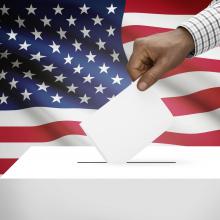
Image via Niyazz/Shutterstock
Today is the 50th anniversary of the landmark Voting Rights Act, passed Aug, 6, 1965. The act, signed into law by President Lyndon B. Johnson, created key provisions to prevent racial discrimination in voting laws.
The Voting Rights Act has been called "the single most effective piece of civil rights legislation ever passed by Congress."
Today's anniversary is a bittersweet commemoration. In 2013, the Supreme Court struck down Section 4, which had required Alabama, Alaska, Arizona, Georgia, Louisiana, Mississippi, South Carolina, Texas, and Virginia to seek federal approval before imposing changes to voter laws.
Influenced in her early 20s by the civil rights movement, Barbara learned about Sojourners during the time that she and her husband served in Tanzania with the Peace Corps. Experiences interacting with folks diverse in religious belief and race during this time profoundly influenced her understanding of faith and social justice. She shares that her life has been influenced by Catholics and Mennonites, pagans and Methodists, Anglicans, Quakers, Hindus, and Buddhists: “At the core, a lot of us on the planet are looking for the same thing: to get along with one another, to have enough to eat, [and] to be able to live with some measure of safety and security.”
We learned about sit-ins, bus boycotts, Martin Luther King, and Malcolm X. But when it came to the Black Panthers, I was taught virtually nothing. I can vaguely recall a high school teacher mentioning Huey Newton, and showing photos of John Carlos and Tommie Smith giving the Black Power salute at the 1968 Olympics. That’s it.
We didn’t hear about the origins of the Black Panthers, or their active improvement of local communities. We didn’t hear about the personalities that created both important exposure and also infighting. We didn’t hear the story of the federal government’s fear of the Panthers or its insidious undercover missions, whose implementation prompted senseless killing and violent responses.
What we didn’t hear, in short, is everything The Black Panthers: Vanguard of the Revolution covers.

Bayard Rustin speaks to the media in 1965. Photo via World Telegram & Sun / Stanley Wolfson / Library of Congress / RNS
Years before the gay rights movement gained momentum, an openly gay black activist named Bayard Rustin advised Martin Luther King Jr. on nonviolent protest tactics and organized the 1963 March on Washington. But attacks on Rustin’s sexual orientation threatened his role in the civil rights movement.
Rustin died in 1987 at age 75 after decades as an activist and organizer on issues including peace, racial equality, labor rights, and gay rights. He will be remembered for support for LGBT rights during the National LGBT 50th Anniversary Celebration July 2-5 in Philadelphia. The four-day event recalls gay rights activists who demonstrated for equal rights at Independence Hall on the Fourth of July from 1965 to 1969.
Caldwell was a “foot soldier” in King’s civil rights army, and he finally made it to Durham, where he closed out a social justice conference focused on a newer movement — the effort to secure full inclusion of LGBT people in the United Methodist Church.
“In some ways there is a possibility that on gay rights and marriage equality, God is speaking more through the judiciary than God is speaking through the United Methodist Church,” Caldwell said in his sermon at a gay-friendly United Methodist church just three miles away from the seminary he said denied him admission.
"We do not see things as they are. We see things as we are.” This Talmudic quote from Rabbi Shemuel ben Nachmani notes that seeing is not always vision. What we see in life is more than what the eye beholds. A person or circumstances right in front of us can be merely the surface of someone or something more profound.
The United States must forever recall the struggles, moves, and marching of the women and men across the Edmund Pettus Bridge. Fifty years ago, ordinary people walked for the right to stand up and be counted. To the naked eye, those sojourners lacked political clout as much as they did fiscal wherewithal. Those citizens were not persons of means, but their intentions were good. They meant well. They meant to do whatever — to get the right to vote.
No whips, dogs, horses, or hoses would stifle their efforts. The Americans who marched from Selma to Montgomery may not have looked like much, but their actions changed this country’s political horizon and racial landscape. Yes, a yearning in their loins propelled them to create social change. They were going to vote at any cost, at any price.
In this week’s lectionary passage, a man crippled from birth wanted “change.” Actually, he wanted coins or any alms that Peter and John could offer (Acts 3:1-11). To this man, the two disciples were in better shape than he was. From his view, he could surely benefit from whatever they had to offer. Yet, Peter exposes their impecunious state: “Look on us. We don’t have a nickel to our names.”
There was nothing spectacular or dazzling about Peter or John.
From Ava DuVernay’s award-winning film to President Obama’s speech at the Edmund Pettus Bridge, America has remembered Selma this year. We have honored grass-roots leaders, acknowledged the sacrifices of civil rights workers and celebrated the great achievement of the Voting Rights Act. At the same time, we have recalled the hatred and fear of white supremacy in 1960s Alabama. But we may not have looked closely enough at this ugly history.
Even as we celebrate one of America’s great strides toward freedom, the ugliest ghosts of our past haunt us in today’s “religious freedom” laws.
Many able commentators have pointed out the problem of laws that purport to protect a First Amendment right to religious freedom by creating an opportunity to violate other people’s 14th Amendment right to equal protection under the law. But little attention has been paid to the struggle from which the 14th Amendment was born — a struggle that played out in Selma 50 years ago and is very much alive in America’s statehouses today.
We cannot understand the new religious freedom law in Indiana and others like it apart from the highly sexualized backlash against America’s first two Reconstructions.
The images of that day in 1965 were quickly seared into the American consciousness: helmeted Alabama state troopers and mounted sheriff’s possemen beating peaceful civil rights marchers in Selma, Ala., as clouds of tear gas wafted around the Edmund Pettus Bridge.
On March 7, 1965 — a day that would become known as “Bloody Sunday” — 600 marchers heading east out of Selma topped the graceful, arched span over the Alabama River, only to see a phalanx of state and local lawmen blocking their way on U.S. Highway 80.
The police stopped the marchers, led by Hosea Williams of the Southern Christian Leadership Conference and John Lewis, chairman of the Student Nonviolent Coordinating Committee, and ordered them to disperse. Then they attacked. Lewis, one of 58 people injured, suffered a skull fracture. Amelia Boynton Robinson, then 53, was beaten unconscious and left for dead, her face doused with tear gas.
Photos of that terrible day were seen around the world. Historians credit the beatings, and the public outrage that followed, as a catalyst for the passage of the Voting Rights Act.
Rodnell Collins stood next to his uncle, Malcolm X, as the latter stared thoughtfully at Plymouth Rock during a visit to Massachusetts when Collins was a child.
It wasn’t until years later that Collins, the son of Malcolm’s sister, Ella Little Collins, would learn what his uncle was thinking: “We didn’t land on Plymouth Rock. The rock was landed on us.”
Malcolm X, the African-American nationalist leader and onetime minister of the Nation of Islam who was assassinated 50 years ago Feb. 21, inspired countless people with the frank and uncompromising way he spoke about race relations in America. And much of what he said about the experiences of black Americans remains true today, experts say.
Yet, while other civil rights leaders of the 1950s and ’60s are more broadly celebrated as American heroes, the fire with which Malcolm X spoke still overpowers the words he was saying.
Revolutionary Love
Revolutionary love has given birth to new life.
We are gasping, breathing (I can’t breathe)
Screaming (We have nothing to lose but our chains)
We have been in the womb long enough
Blinking to the blinding light of the revolution
Our eyes adjusting
And we answer with what love looks like in public
Justice
I’ve been thinking about the life birthed out of revolutionary love. The night I met Waltrina, we stayed up until an ungodly hour — instant sister-friends. We bonded, talking about everything, about finding and losing faith — in God and humanity — then slowly picking it up again piece by piece, about being the diversity in mostly white professional spaces, about friends, family, and the struggle to find our places (as 30-somethings) in this “new” freedom movement.
Out of a deep revolutionary love inspired by Jesus and nourished from the well of our people, we have determined to get in where we fit in, living out the belief that there is a place for everyone in the movement.
Today's fight against the powers and principalities of systemic injustice cannot be left to the continued service of the elders that survived the 1960s civil rights movement, nor hoisted solely upon the shoulders of the teens and 20-somethings of today, just because they have energy and new ideas. Despite the focus on elders and youth, this is an intergenerational movement that requires all of us to answer the communal call. I am encouraged by one of my mentors, Mama Ruby (Sales) who says it is time to have all hands on deck.
The zeitgeist is clear. Much like Emmett Till’s murder in 1955 sparked the civil rights movement, the tragic string of murders of blacks in 2014 catalyzed another movement, the #BlackLivesMatter movement. This movement picks up where the civil rights movement left off, addressing systemic racial injustice in the legal and penal system, educational system, and economic system. In some ways, the battles we fight are more challenging than the ones our grandparents fought. Undeniably, we face off in a more complex world and against forms of systemic racism that are so subtle that they are almost invisible. Nevertheless, due to a unique combination of gifts and experiences, I’m hopeful that my generation of black millennials is ready to lead us on to a more equitable society. Here’s why.
1. We are propelled by the prophetic legacy of the past.
With a technological savvy that gives us unprecedented access to the true history of our people, and as perhaps the last generation to breathe the same air as the civil rights generation, we draw upon the legacies of the past as we move forward. When I sense that my capacity to forgive is waning, I recall my recent conversations with several survivors of the 16th Street Baptist Church bombing in Birmingham, Ala., and I’m reminded of the inner healing that forgiveness promises. When I am tempted to pander to the powers that be, I call my radical granddad and ask him to tell me again about the many Black Panthers meetings that took place at the church he pastored in Berkeley, Calif., in the 1960s. When I feel that I’m losing my courage, I read Ida B. Wells’ autobiography and am reminded that we are not alone. We are connected — part of a chain of black activists, each generation inspiring the next. Our heroes guide us every day.
FOR TWO YEARS in a row we have seen significant films about oppression and struggle nurture public consciousness. Selma and 12 Years a Slave invite us to reimagine iconic moments closer than we usually think, their protagonists more like us. Slavery had not been portrayed in such visceral fashion in a mainstream film before 12 Years. Before Selma, images of Martin Luther King Jr. had never quite transcended the almost superhuman projections that accrue from his martyrdom and decades of being co-opted by cultural mavens from Apple to Glenn Beck.
These films create new benchmarks for the mainstream depiction of black history, black struggle, and wider perceptions. But entertaining portrayals of inspiration contain a powerfully dangerous substance that needs to be handled with care. The cathartic tears shed at a film about other people’s suffering and heroism can also be a narcotic, implying that the work has been done. Think of all the talk about freedom struggles after Braveheart, or challenging the principalities and powers after The Matrix. The problem was, most of it was just that. Talk.
BORDERED BY strip malls, chain restaurants, and drug stores, four-lane Hillsboro Pike in Nashville, Tenn., carries cars from the Vanderbilt University area out to suburban neighborhoods. Every afternoon, thousands of drivers heading home from the city crest a ridge and pass a long, red-brick church.
That church, Calvary United Methodist, is where I was confirmed, participated in youth group, and sang in the choir. In the archives room off the education wing, a visitor can open a filing cabinet drawer, flip past photos of youth group retreats and church league basketball games, and find a manila folder labeled “Rev. Dr. Sam Dodson, 1958-1965.”
The folder is thin, but its contents are weighty. A letter to the local Methodist bishop from the church’s board explains that Dodson cannot adequately minister to his congregation while participating in political activities and suggests he be demoted to assistant pastor. A newspaper clipping from 1965 announces that Rev. Dodson and his family will be moving to Athens, Greece, where he will head St. Andrew’s American Church. I recognize some of the names signed to letters calling for Dodson’s demotion—an usher who pressed strawberry candies into my palm whenever I asked, a woman who looked me in the eye when I was 11 and told me I would be a leader in the church someday.
1. Here Is What Happens When Each Myers-Briggs Personality Type Makes A New Year’s Resolution
These may or may not be scarily accurate...
2. The Birth of a New Civil Rights Movement
“The shattering events of 2014, beginning with Michael Brown’s death in Ferguson, Missouri, in August, did more than touch off a national debate about police behavior, criminal justice and widening inequality in America. In 2014, the new social justice movement became a force that the political mainstream had to reckon with.”
3. 10 Resolutions for 2015
“We often only use the word in the context of this season, but “resolution” is a nuanced noun. Some of its definitions include: A firm decision to do or not to do something; the quality of being determined or resolute; the action of solving a problem, dispute, or contentious matter. In a world of seemingly endless conflicts, I sure like the sound of that. We need more of all of these qualities just now in this brand new year.”
4. The Tragedy of the American Military
“The American public and its political leadership will do anything for the military except take it seriously. The result is a chickenhawk nation in which careless spending and strategic folly combine to lure America into endless wars it can’t win.”









